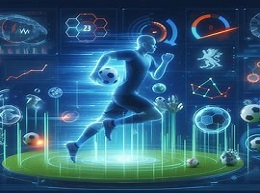The Rise of AI in Sports Coaching and Performance Analysis

The Rise of AI in Sports Coaching and Performance Analysis
Artificial intelligence (AI) is rapidly transforming the world of sports coaching and performance analysis, offering insights and strategies that were previously unimaginable. From enhancing athlete training regimens to providing real-time game analysis, AI is revolutionizing how sports are played and managed. This article explores the growing role of AI in sports, showcasing its applications and impact across different disciplines.
AI in Sports: AI technologies, including machine learning algorithms and computer vision systems, are being increasingly integrated into various aspects of sports coaching and performance analysis. These technologies analyze vast amounts of data, ranging from player statistics to game footage, to provide coaches and athletes with actionable insights for improving performance.
Enhancing Athlete Training and Development: AI-powered training platforms are revolutionizing the way athletes train and develop their skills. These platforms use machine learning algorithms to analyze athlete biomechanics, movement patterns, and performance metrics to identify areas for improvement. By providing personalized training programs and feedback, AI helps athletes optimize their training regimens and maximize their potential.
Optimizing Game Strategy and Analysis: In addition to athlete training, AI is also transforming how coaches analyze and strategize during games. Computer vision systems can automatically track player movements and game dynamics in real-time, allowing coaches to make data-driven decisions on the sidelines. Moreover, AI algorithms can analyze historical game data to identify patterns and trends, helping teams develop winning strategies for future matches.
Improving Injury Prevention and Rehabilitation: AI is playing a crucial role in injury prevention and rehabilitation in sports. By analyzing athlete biomechanics and movement patterns, AI algorithms can detect potential injury risks and provide recommendations for injury prevention strategies. Additionally, AI-powered rehabilitation platforms use personalized training programs and feedback to help injured athletes recover more quickly and effectively.
Examples of AI in Sports:
- In soccer, AI-powered tracking systems analyze player movements and game dynamics to provide real-time insights to coaches and players.
- In basketball, AI algorithms analyze shooting techniques and shot trajectories to help players improve their shooting accuracy.
- In tennis, AI-powered video analysis tools can track ball trajectory and player movements to provide detailed performance feedback to coaches and players.
Challenges and Future Directions: While AI holds tremendous promise for the future of sports coaching and performance analysis, there are challenges to overcome, including data privacy concerns, ethical considerations, and the need for continued technological advancements. However, with ongoing research and development, AI is expected to play an increasingly significant role in optimizing athlete performance and shaping the future of sports.
AI is revolutionizing sports coaching and performance analysis, providing coaches and athletes with unprecedented insights and strategies to improve performance. From personalized training regimens to real-time game analysis, AI technologies are transforming how sports are played and managed. As AI continues to evolve, its impact on sports is only expected to grow, ushering in a new era of athletic excellence and innovation.